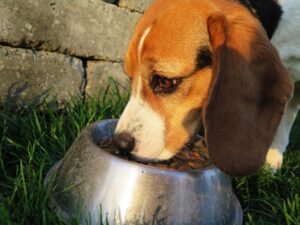
Ensuring that your dog receives a balanced diet rich in essential vitamins and minerals is crucial for maintaining their overall health and well-being. Just like humans, dogs require a complex array of nutrients to support their bodily functions, promote growth, and prevent diseases. This article delves into the top vitamins and minerals that are essential for your dog’s optimal health, providing insights into their benefits and the best sources for each nutrient.
Vitamin A
Vitamin A is vital for maintaining a healthy coat, skin, and eyes in dogs. It plays a crucial role in immune function, helping to fend off infections and diseases. Moreover, Vitamin A is involved in the reproductive process and supports the proper functioning of various organs.
Sources of Vitamin A
Good sources of Vitamin A include liver, fish oils, eggs, and certain vegetables like carrots and sweet potatoes. Commercial dog foods are typically fortified with Vitamin A, ensuring that your pet receives an adequate amount through their diet.
Vitamin B Complex
The B vitamin group is essential for energy metabolism and maintaining the health of the nervous system. Each B vitamin plays a specific role, such as B1 (thiamine) for carbohydrate metabolism, B2 (riboflavin) for enzyme functions, and B12 (cobalamin) for red blood cell production.
Sources of Vitamin B Complex
Meat, poultry, fish, eggs, and dairy products are rich sources of B vitamins. Additionally, green leafy vegetables and whole grains can contribute to your dog’s B vitamin intake. Many commercial dog foods include B vitamins to ensure a balanced diet.
Vitamin C
While dogs can produce Vitamin C in their liver, supplemental Vitamin C can be beneficial, especially for older dogs or those with joint issues. Vitamin C acts as an antioxidant, reducing inflammation and supporting the immune system.
Sources of Vitamin C
Fruits like blueberries, strawberries, and oranges, as well as vegetables such as broccoli and Brussels sprouts, provide Vitamin C. However, it is important to monitor the amounts given, as excessive Vitamin C can lead to digestive upset in dogs.
Vitamin D
Known as the “sunshine vitamin,” Vitamin D is crucial for calcium absorption and bone health. It also plays a role in muscle and nerve control, as well as immune function. A deficiency in Vitamin D can lead to bone disorders such as rickets.
Sources of Vitamin D
Fish oils, fatty fish (like salmon and mackerel), and egg yolks are excellent sources of Vitamin D. Some dog foods are also fortified with this essential vitamin to support bone health.
Vitamin E
Vitamin E is a powerful antioxidant that helps protect cells from oxidative damage. It is essential for maintaining healthy skin and coat, as well as supporting the immune system and protecting the heart.
Sources of Vitamin E
Sources of Vitamin E include plant oils (such as sunflower and safflower oil), nuts, seeds, and green leafy vegetables. Dog foods often contain added Vitamin E to ensure adequate intake.
Vitamin K
Vitamin K is essential for normal blood clotting and bone metabolism. A deficiency in Vitamin K can lead to bleeding disorders and issues with bone health.
Sources of Vitamin K
Green leafy vegetables, meat, and dairy products are good sources of Vitamin K. Fermented foods can also provide additional Vitamin K, although it’s typically available in sufficient amounts in commercial dog foods.
Calcium
Calcium is a critical mineral for bone and teeth health. It also plays a role in muscle function, nerve signaling, and blood clotting. Growing puppies and lactating females have higher calcium needs compared to adult dogs.
Sources of Calcium
Dairy products, fish with bones (such as sardines), and leafy green vegetables provide calcium. It’s important to balance calcium with phosphorus in the diet to prevent deficiencies or imbalances.
Iron
Iron is essential for the formation of hemoglobin, which carries oxygen in the blood. It also plays a role in various enzymatic processes. Iron deficiency can lead to anemia and related health issues.
Sources of Iron
Meat, especially red meat, liver, and fish, are excellent sources of iron. Some vegetables and grains also contain iron, but the bioavailability from plant sources is lower than that from animal sources.
Zinc
Zinc is important for skin health, immune function, and wound healing. It also plays a role in maintaining a healthy metabolism and supporting reproductive health.
Sources of Zinc
Meat, shellfish, and eggs are rich in zinc. Some plants, like legumes and seeds, also contain zinc, but the presence of phytates in plants can inhibit absorption.
Magnesium
Magnesium is involved in over 300 enzymatic reactions in the body, including energy production, protein synthesis, and muscle and nerve function. It also contributes to bone health.
Sources of Magnesium
Whole grains, seeds, nuts, and leafy green vegetables are good sources of magnesium. Some fish, like mackerel, also provide magnesium.
Selenium
Selenium is a trace mineral that acts as an antioxidant, protecting cells from damage. It also plays a role in thyroid function and the immune system.
Sources of Selenium
Selenium is found in meat, fish, eggs, and nuts. Brazil nuts are particularly high in selenium, but should be given sparingly due to their high concentration.
Conclusion
Providing your dog with a diet that is rich in essential vitamins and minerals is crucial for ensuring their long-term health and vitality. While commercial dog foods are often formulated to meet these nutritional needs, it’s important to be aware of the specific requirements of your dog based on their age, breed, and health status. Always consult with a veterinarian before making any significant changes to your dog’s diet, especially when considering supplements. By understanding and prioritizing these key nutrients, you can help your furry friend lead a healthy and happy life.
#ChatGPT assisted in the creation of this article.







